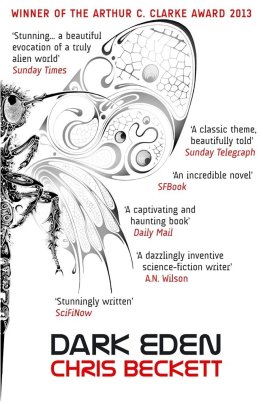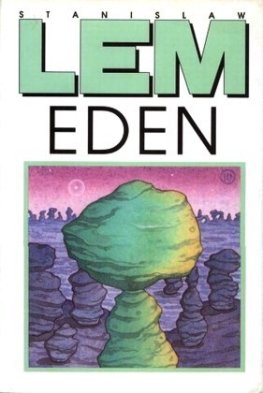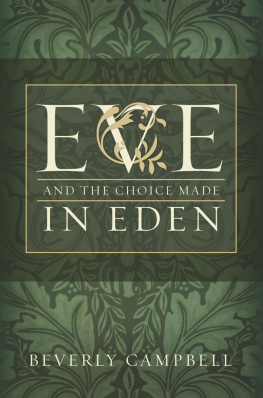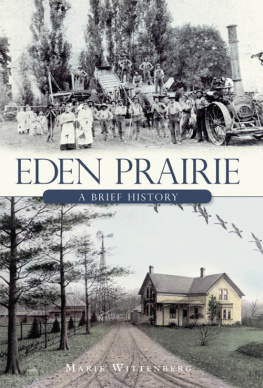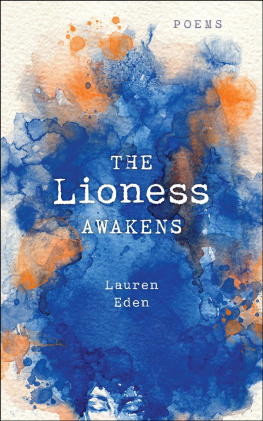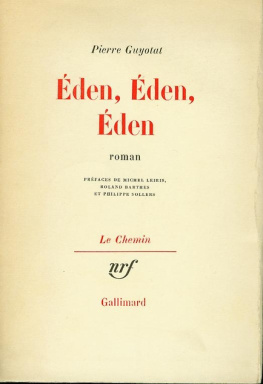From Eden to Eternity
THE MIDDLE AGES SERIES
Ruth Mazo Karras, Series Editor
Edward Peters, Founding Editor
A complete list of books in the series
is available from the publisher.
From Eden
to Eternity

Creations of Paradise
in the Later Middle Ages
Alastair Minnis

Copyright 2016 University of Pennsylvania Press
All rights reserved. Except for brief quotations used for
purposes of review or scholarly citation, none of this book
may be reproduced in any form by any means without
written permission from the publisher.
Published by
University of Pennsylvania Press
Philadelphia, Pennsylvania 19104-4112
www.upenn.edu/pennpress
Printed in the United States of America on acid-free paper
1 3 5 7 9 10 8 6 4 2
A catalogue record for this book is available
from the Library of Congress.
ISBN 978-0-8122-4723-7
For Felix
CONTENTS

ILLUSTRATIONS

INTRODUCTION

Creating Paradise
Very old are we men;
Our dreams are tales
Told in dim Eden
By Eves nightingales...
Walter de la Mare, All thats past
Eden has given generations of writers the opportunity to imagine an alternative universe, a Utopia free from the brevity, and the pain and suffering, of what passes as normal life on earth. Here have been found the origins of human society itself; of sexuality, marriage, of mans relationship with nature, of property rights, of law and the proper regulation of the state. The prelapsarian world has been used to justify both egalitarianism and slavery, equality and inequality, and the dignity and inferiority of womankindto name but a few of the compelling issues that have arisen in discussion of life in, and after, Eden.
The schoolmen of the later Middle Ages found in the state of innocence an enabling context, perhaps even a transformative space, for thought wherein the present-day situation of humankind could be set aside. It allowed them to engage in investigation free from the restrictions imposed by the conditions and demands of life after the Fall, in what generally was termed the state of misery. To some extent, then, their Eden was a never-never-land or fantasy world, where speculation could be pursued without concern for practical consequence or contemporary relevance. When medieval theologians debated the nature of sex, horticulture, dining, worship, or just about any form of human activity before the Fall, they were talking about what with no intervening pain or suffering.
According to a long-standing tradition, Adam and Eve fell the very same day on which Eve was created. So, then, as a fully functioning paradise, with its original complement of creatures (Adam and Eve included), the Garden of Eden did not last long. Therefore, comment about the conditions which prevailed therein was inevitably speculative, prefaced, whether explicitly or implicitly, with a perpetual what if... ?
On the other hand, the theologians regularly remembered Eden as they investigated certain crucial characteristics of humankind and of human society which self-evidently existed in the world after the Fall. If something was to be judged fundamentally and irrefutably human, it had to be found in Eden. This harking-back to paradise was essentially a search for origins: by finding the starting points of forms of behavior, ideals, and institutions, the theologians hoped to understand them better. The foundation of holy matrimony is a clear case in pointand particularly worthy of mention because its prelapsarian source has been noted in countless wedding services Here I quote from The Parsons Tale of Geoffrey Chaucer (d. 1400), a treatise which stands in a long line of religious reference books and priests handbooks. The way in which the aspirations of romantic love (termed fin amor in the High Middle Ages) have infiltrated the standard late medieval theology of marriage is particularly interesting.
Allas, allas! That evere love was synne! to quote another of Chaucers characters, the Wife of Bath. Some thinkers, including several of the most formidable of their time, were perfectly willing to countenance that idea. Speculation about prelapsarian love in particular and life in general was by no means monolithic during the medieval centuries, and certainly not monotonous. On the contrary, a rich array of attitudesranging from the sublime to the ridiculous, the compelling to the bizarremay be discerned. In this book I hope to do justice to some of them.
The time frame with which I am primarily concerned extends from the 1220s until circa 1564, though significant materials from before and after those dates are cited on occasion. Earlier writings, including (indeed, especially) those of Augustine, are discussed in light of their subsequent significance. Chief among the later writings quoted is John Miltons Paradise Lost (completed 165863), which has proved particularly useful in posing and clarifying vital questions. The year 1564 saw the death of John Calvin, foundational theologian of the Reformation and progenitor of Puritanism, while during the period 122327 Peter Lombards Sentences replaced the Bible in lecture courses in the faculty of theology at the University of Paris, a bold innovation attributed to Alexander of Hales, O.F.M. (c. 11851245). The Sentences was the authoritative textbook for the study of speculative theology until the sixteenth century; even the young Martin Luther (14831546) dutifully produced a commentary. Its second book treats of the creation, posing a series of questions which were debated, sometimes with considerable vehemence, by generation after generation of scholars, in their Sentences commentaries, quodlibets, and summae. The answers offered by a representative range of those texts shall be considered below. Thomas Aquinas, O.P. (c. 12251274), will frequently be consulted on power, death, and the body in and after Edennot least because in his Summa theologiae there are some surprises in store, or at least surprises to those who think of him simplistically as a gatekeeper of intellectual conservatism, a role he was assigned in the Counter-Reformation.
Indeed, the schoolmen seem to have claimed a kind of intellectual license when they discussed the world that would have been had the Fall not occurred, a world which existed only in the minds of fallen men. For example, the authors of the Summa Alexandri (the magnificent summa associated with Alexander of Hales) and for a postlapsarian woman to reject the temptations of the fleshmost obviously by entering a religious orderis therefore a virtuous act indeed.
But was Eves degree of perfection such that Adams seed could have been introduced into Eves womb with no loss (sine ulla corruptione) of the wifes integrity
and/or revisionist discourse concerning the beginnings of human history did develop in Western Europe. At one end of the scale there are amplifications of the Genesis narrative which add individually modest but collectively significant amounts of detail, as when, in the
Next page

